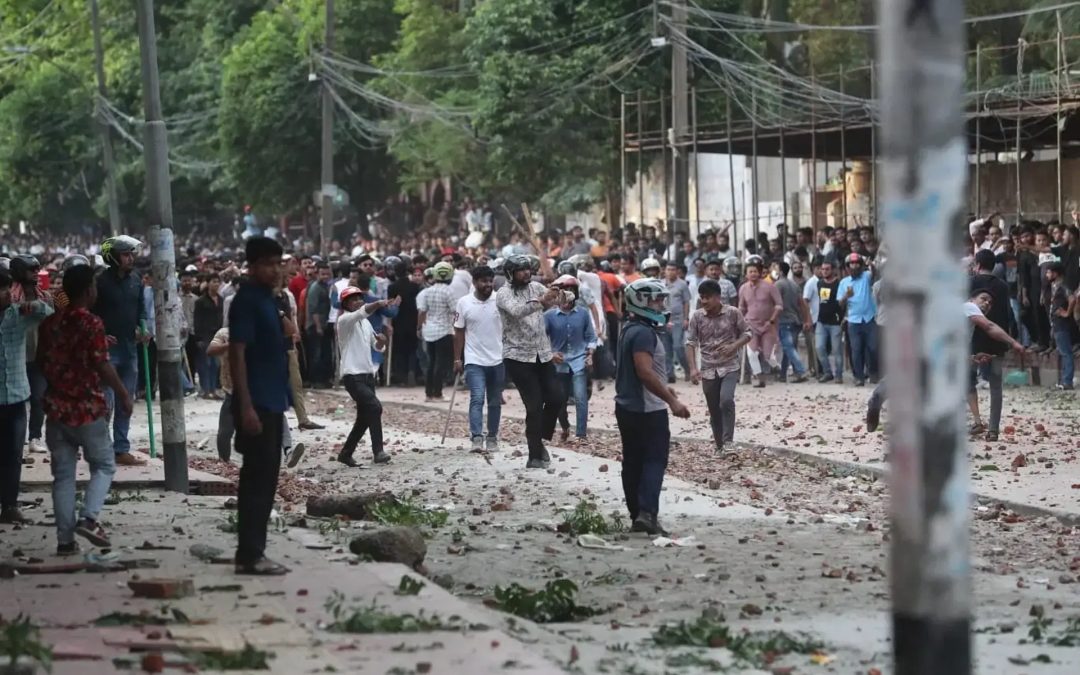Students are being attacked with stones and bricks as they protest outside Dhaka University’s Dr. Muhammad Shahidullah Hall. Monday afternoon at Dhaka University. | Photo: Sajid Hossain
When Silence Is Not an Option
Fairness and equality are principles that every society should uphold.
Yet, when people’s voices are silenced, it is a sign of a deeper problem.
In Bangladesh, recent events have shown how those in power suppress legitimate demands.
The attack on peaceful student protesters seeking fair reforms has left the nation shaken.
This article looks at what happened, the larger issues behind it, and why it’s time for everyone to stand together for justice and unity.
The Incident: Voices Silenced by Force
On July 15, 2024, the Gana Sanghati Andolan (Mass Solidarity Movement) spoke out against a violent attack on students by the Chhatra League.
These students were peacefully protesting for changes in the government job quota system.
A joint statement by Jonayed Saki, Chief Coordinator of the Mass Solidarity Movement, and Abul Hasan Rubel, its Executive Coordinator, revealed the shocking extent of the violence.
Over 100 students were injured, leaving the Dhaka University area stained with blood.
The students had gathered to call for a fair and open process in government hiring.
Instead of listening, the government allowed the Chhatra League, a group loyal to them, to respond with violence.
This attack is part of a worrying trend of using force to crush legitimate demands and silence opposition.

Mass Solidarity Movement
Government Accountability: Ignoring the Real Issues
Leaders from the Mass Solidarity Movement have criticized the head of government for dismissing the student’s demands as unwarranted.
Such comments show a troubling lack of connection with the challenges faced by ordinary people.
The government has not addressed the serious problems of corruption, poor governance, and economic struggles that affect the nation.
Instead of solving these issues, the administration uses distractions and suppresses dissent.
While this may help them stay in power for now, it fuels anger among citizens and damages the democratic values that hold the country together.
The Risk to Unity: Dividing the Nation
The attack on student protesters shows a larger effort to divide and weaken the nation’s unity.
Using fear and violence to control people not only isolates citizens but also breaks the bonds that keep the country strong.
The government’s actions are creating divisions, which make the nation more vulnerable to both internal unrest and external threats.
The mass solidarity movement’s leaders have urged people to stay alert to these attempts to divide them.
They stress the importance of standing together against efforts to exploit these divisions for political gain.
The Path Forward: Standing Strong for Justice
Despite the attacks, the student protesters represent hope for a better future.
Their demand for equitable reforms serves as a poignant reminder that enduring fear and intimidation is the key to bringing about change.
The Mass Solidarity Movement has encouraged all citizens to support the students’ fight for justice and fairness.
Young people have been urged to remain determined in their demands, as lasting change often requires persistence.
The broader public must also resist authoritarian measures and work toward a society where equality, justice, and democracy thrive.
Verdict: A Critical Moment for Bangladesh
The events of July 2024 highlight the urgent need to address deeper problems in Bangladesh.
Violence against peaceful protests shows that systemic issues cannot be ignored any longer.
The government must prioritize open dialogue and end the cycle of division and suppression.
Bangladesh is currently experiencing a pivotal moment.
Its people have a choice: accept fear and division, or unite to protect their rights and freedoms.
By raising their voices and standing together, they can build a future based on justice and unity.
The nation’s strength lies in its ability to uphold these values—the foundation of any successful democracy.

